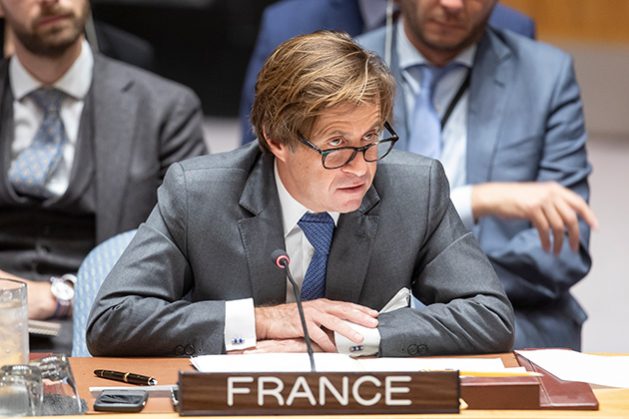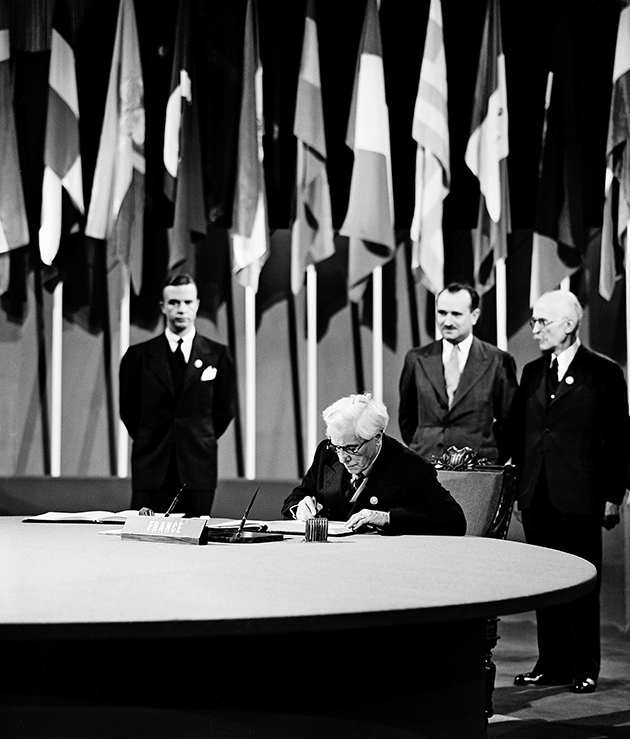The Charter of the United Nations: Ideals for Shaping Our Reality

NEW YORK, Jul 31 (IPS) - "Reconciling the requirements of the ideal with the possibilities of the real": this is how Georges Bidault, Minister for Foreign Affairs and head of the French delegation to the San Francisco Conference, summed up the objective pursued by the drafters of the Charter of the United Nations.
On the still living ashes of the Second World War, the fathers of an Organization charged with developing friendly relations between nations, promoting human rights and economic and social progress were less utopian than visionary. They understood that the community of States should have a common constitution. It has been tested by conflict, crisis and upheaval, but its resilience and strength have shaped the very structure of contemporary international relations.
The Charter brings us together
It defines the United Nations as "a centre for harmonizing the actions of nations", where each member is treated as an equal across social, economic or political differences.
With the quadrupling of the number of contracting parties since its inception, the Charter, which has become universal, truly expresses the values and aspirations of humanity.
That is why France attaches so much importance to ensuring that diversity—cultural, legal and linguistic—is duly reflected within the Organization, in its staff and in the way it operates: the United Nations has the heavy but noble task of ensuring the participation of all peoples in international discussion.
As revealed by the major consultation under way in the context of the commemoration of the seventy-fifth anniversary, 95 per cent of our contemporaries believe that only international cooperation will make it possible to respond to the challenges of today and tomorrow. But it must also reflect their voice.
The Charter is the summit of an international order based on law: Article 103 gives it primacy over other international legal instruments.
In the most difficult negotiations, it remains the frame of reference, and the precious Blue Booklet is never far away. It binds States as well as the principal organs of the United Nations.
The Security Council thus exercises its responsibility as guarantor of the maintenance of international peace and security within the strict framework of the Charter, when deciding on measures to combat arms proliferation, establishing peacekeeping operations, authorizing the delivery of cross-border humanitarian aid to Syria or referring situations to the International Criminal Court.
These decisions must be respected by all Member States in accordance with Article 25 of the Charter.
The Charter protects us
The COVID-19 pandemic is a wake-up call for multilateralism, because the virus knows no borders, and no one is spared. The global and cross-cutting nature of the health crisis logically points to the United Nations as the only truly universal and multisector forum for responding to it.
It is France's profound conviction that whenever we accept that the resolution of international crises takes place outside the multilateral framework, chaos threatens to prevail.
That is particularly true today in the Middle East, where the risk of conflagration has never been greater. At a time when civilian populations have already suffered too much from the scourge of war and terrorism, we need more than ever to prevent a military spiral and to put an end to the serious human rights violations and humanitarian disasters that continue to take place, in this region as in other parts of the world.

As President Macron said in his address to the General Assembly on 24 September 2019, in a world that has become multipolar, we must reinvent "strong multilateralism", as opposed to the temptation of national withdrawal. It was on the basis of that conviction that last year France, together with Germany, launched an Alliance for Multilateralism, a flexible framework bringing together countries of good will that wish to promote both the multilateral method and concrete initiatives in various areas that illustrate its importance.
To be strong, the multilateralism that we embody here in New York must be effective. It must address without delay the greatest challenges of our time, all of which are global: climate change, health and food security, the protection of biodiversity, terrorism, the proliferation of weapons of mass destruction, inequalities, migration, massive violations of international humanitarian law and human rights, and the new challenges posed by technology.
The Charter, in its profound modernity, set the goal, 75 years ago, of achieving international cooperation in solving international problems in all these areas. France has taken the initiative to mobilize the international community on these issues, whether by launching the One Planet Summit with the United Nations and the World Bank, or by co-organizing the Generation Equality Forum in the near future, 25 years after the Fourth World Conference on Women, held in Beijing in 1995. In the face of global challenges, international cooperation is the only possible way forward; if we do not move forward, we will retreat.
The Charter is the foundation of our collective action
It offers a method, rules and tools. It enshrines negotiation as the main way forward. The principles it lays down, and in particular the universality of human rights, are non-negotiable.
It provides several means of action, including peacekeeping operations and international sanctions. The specific prerogatives that it confers on certain members should not be received as licenses but as responsibilities.
That is why France, together with Mexico, has, since 2013, called for the suspension of the veto in the event of mass atrocities in the form of a political, voluntary and collective commitment by the five permanent members of the Security Council. To date, 105 Member States have joined this initiative.
The Charter in no way prevents the necessary modernization of the Organization, which, on the contrary, has been constantly reinventing itself.
The decompartmentalization of the various pillars and components of the United Nations galaxy, as reflected in the vision of "Delivering as One", is necessary for the pursuit of the Sustainable Development Goals of the 2030 Agenda.
The efforts undertaken in that regard, in particular the triple reform undertaken by the Secretary-General (reform of the peace and security architecture, development reform and management reform), must be supported. Each of the principal organs must play its part by optimizing its work.
Like a robust building that has stood the test of time, the Charter can be amended to better reflect the realities of the contemporary world. In that regard, France would like the Security Council to be expanded, as it was for the first time in 1963, to take into account the emergence of new Powers and to allow for a stronger presence on the African continent.
For 75 years, the Charter has been our highest common denominator. Its relevance remains unaltered. Sometimes a home, sometimes a bulwark, it allows the pursuit of an ideal of peace and prosperity towards which we must strive, with modesty but also with courage. It is incumbent upon us to pass on its values and promises to future generations.
This article was first published by the UN Chronicle on 26 June 2020.
© Inter Press Service (2020) — All Rights Reserved. Original source: Inter Press Service
 Global Issues
Global Issues